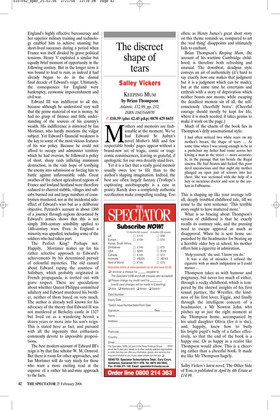The discreet shape of tears
Salley Vickers
KEEPING MUM by Brian Thompson Atlantic, £12.99, pp. 232, ISBN 1843544970 V £10.39 (plus £2.45 p&p) 0870 429 6655 Mothers and memoirs are fashionable at the moment. We’ve had Edward St Aubyn’s novel Mother’s Milk and few respectable books’ pages appear without a brand-new set of tragic, comic or tragicomic reminiscences, leaving us grateful, if apologetic, for our own drearily staid lives.
Yet it is a fact that a really good memoir usually owes less to life than to the author’s shaping imagination. Indeed, the best are often largely fantasy (Trollope’s captivating autobiography is a case in point). Rarely does a completely authentic recollection make compelling reading. Too often, as Henry James’s great short story on this theme reminds us, compared to art the ‘real thing’ disappoints and ultimately fails to enchant.
Brian Thompson’s Keeping Mum, the account of his wartime Cambridge childhood, is therefore both refreshing and unusual. The downbeat, deadpan style conveys an air of authenticity (it’s hard to say exactly how one makes that judgment but it is a judgment which can be made); but at the same time he entertains and enthrals with a story of deprivation which neither boasts nor moans, while escaping the deadliest memoir sin of all, the selfconsciously ‘cheerfully brave’. (Cheerful courage should mostly be kept for life, where it is much needed; it takes genius to make it work on the page.) Much of the charm of the book lies in Thompson’s drily unsensational style:
I had often noticed two white scars on my mother’s breast, the shape of tears ... At some time when I was young enough to be in a pushchair my father had come across her kissing a man in the street — more accurately, in the passage that ran beside the Regal cinema. He had beaten and kicked this poor devil unconscious and that night my mother plunged an open pair of scissors into her chest. She was sectioned with the help of a lazy or incurious doctor and sent to the asylum in Fulbourne.
This is shaping up like your average tellall, deeply troubled childhood tale, till we come to the next sentence: ‘This terrible story ought to have mattered more.’ What is so bracing about Thompson’s version of childhood is that he exactly recalls its contrary side, and the pressing need to escape approval as much as disapproval. When he is sent home unpunished by the headmaster for beating up a horrible older boy at school, his mother offers him a cigarette in admiration.
‘Help yourself,’ she said. ‘I know you do.’ It was a day of miracles. I refused the cigarette with as much indignation as I could muster ...
Thompson takes us with humour and poignancy, but never too much of either, through a rocky childhood, which is tempered by the shrewd insights of his first sexual partner, the Wrestler, the kindness of his first lover, Figgie, and finally through the intelligent concern of a headmaster, a Mr Newton John, who pitches up at just the right moment at the Thompson home, accompanied by his small daughter Olivia (for it is she), and, happily, knew how to bully his bright pupil’s bully of a father effectively, so that the end of the book is a happy one. Or as happy as a realist like Thompson would allow. This is a cheering rather than a cheerful book. It made me like Mr Thompson hugely.


































































 Previous page
Previous page